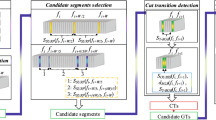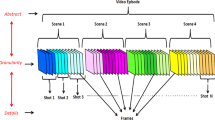Abstract
In sports programs, there are many special cases making shot boundary detection difficult. Targeted for these special cases, not be considered by existing work, this paper presents a shot boundary detection scheme to detect both cuts and gradual transition efficiently. For shot detection, the algorithm is proposed to resist continuous flashes, camera occlusion or image blur that have not been considered before. For gradual transition detection, a unified method is presented to detect various transitions or special effects, together with an algorithm to reduce the false positives caused by fast camera or object motions. The cut detection and gradual transition detection are implemented serially to avoid repeated detection operations. Compared with existing typical works, the proposed scheme obtains higher correct detection rate and fast detection speed, and is more suitable for sports program analysis.
Access this chapter
Tax calculation will be finalised at checkout
Purchases are for personal use only
Preview
Unable to display preview. Download preview PDF.
Similar content being viewed by others
References
Divakaran, A.: Multimedia Content Analysis: Theory and Applications. Springer, Boston (2009)
Koprinska, I., Carrato, S.: Temporal video segmentation: A survey. Signal Processing: Image Communication 16(5), 477–500 (2001)
Zhang, H.J., Kankanhalli, A., Smoliar, S.W.: Automatic Partitioning of Full-motion Video. Multimedia Systems 1(1), 10–28 (1993)
Hampapur, A., Jain, R., Weymouth, T.: Digital Video Segmentation. In: Proc. ACM Multimedia 1994, San Francisco, CA, pp. 35–364 (October 1994)
Nam, J., Tewfik, A.H.: Detection of Gradual Transitions in Video Sequences Using B-Spline Interpolation. IEEE Trans. Multimedia 7(4), 667–679 (2005)
Truong, B.T., Dorai, C., Venkatesh, S.: New enhancements to cut, fade, and dissolve detection processes in video segmentation. In: Proc. ACM Multimedia, pp. 219–227 (2000)
Arman, F., Hsu, A., Chiu, M.-Y.: Image Processing on Encoded Video Sequences. Multimedia Systems 1(5), 211–219 (1994)
Joyce, R.A., Liu, B.: Temporal Segmentation of Video Using Frame and Histogram Space. IEEE Trans. Multimedia 8(1), 130–140 (2006)
Zabih, R., Miller, J., Mai, K.: A feature-based algorithm for detecting and classifying production effects. Multimedia Systems 7(2), 119–128 (1999)
Cernekova, Z., Pitas, I., Nikou, C.: Information Theory-Based Shot Cut/Fade Detection and Video Summarization. IEEE Trans. Circuits and Systems for Video Tech. 16(1), 82–91 (2006)
Gao, X., Tang, X.: Unsupervised Video-Shot Segmentation and Model-Free Anchorperson Detection for News Video Story Parsing. IEEE Trans. Circuits and Systems for Video Technology 12(9), 765–776 (2002)
Ngo, C.-W.: A robust dissolve detector by support vector machine. In: Proc. ACM Int. Conf. Multimedia, pp. 283–286 (2003)
Han, B., Hu, Y., Wang, G., Wu, W., Yoshigahara, T.: Enhanced Sports Video Shot Boundary Detection Based on Middle Level Features and a Unified Model. IEEE Transactions on Consumer Electronics 53(3), 1168–1176 (2007)
Matsumoto, K., Naito, M., Hoashi, K., Sugaya, F.: SVM-Based Shot Boundary Detection with a Novel Feature. In: Proc. IEEE Int. Conf. Multimedia and Expo., pp. 1837–1840 (2006)
Feng, H., Fang, W., Liu, S., Fang, Y.: A New General Framework for Shot Boundary Detection Based on SVM. Proc. IEEE ICNN&B 2, 1112–1117 (2005)
Kawai, Y., Sumiyoshi, H., Yagi, N.: Shot boundary detection at TRECVID 2007. In: Proc. of TRECVID Workshop 2007 (2007)
Yuan, J., Wang, H., Xiao, L., Zheng, W., Li, J., Lin, F., Zhang, B.: A Formal Study of Shot Boundary Detection. IEEE Transactions on circuits and systems for video technology 17(2), 168–186 (2007)
Ekin, A., Tekalp, A.M., Mehrotra, R.: Automatic Soccer Video Analysis and Summarization. IEEE Transactions on Image Processing 12(7), 796–807 (2003)
Adjeroh, D., Lee, M.C., Banda, N., Kandaswamy, U.: Adaptive Edge-Oriented Shot Boundary Detection. EURASIP Journal on Image and Video Processing 2009, Article ID 859371, 13 pages (2009), doi:10.1155/2009/859371
Author information
Authors and Affiliations
Editor information
Editors and Affiliations
Rights and permissions
Copyright information
© 2010 Springer-Verlag Berlin Heidelberg
About this paper
Cite this paper
Lian, S., Dong, Y., Wang, H. (2010). Efficient Temporal Segmentation for Sports Programs with Special Cases. In: Qiu, G., Lam, K.M., Kiya, H., Xue, XY., Kuo, CC.J., Lew, M.S. (eds) Advances in Multimedia Information Processing - PCM 2010. PCM 2010. Lecture Notes in Computer Science, vol 6297. Springer, Berlin, Heidelberg. https://doi.org/10.1007/978-3-642-15702-8_35
Download citation
DOI: https://doi.org/10.1007/978-3-642-15702-8_35
Publisher Name: Springer, Berlin, Heidelberg
Print ISBN: 978-3-642-15701-1
Online ISBN: 978-3-642-15702-8
eBook Packages: Computer ScienceComputer Science (R0)




